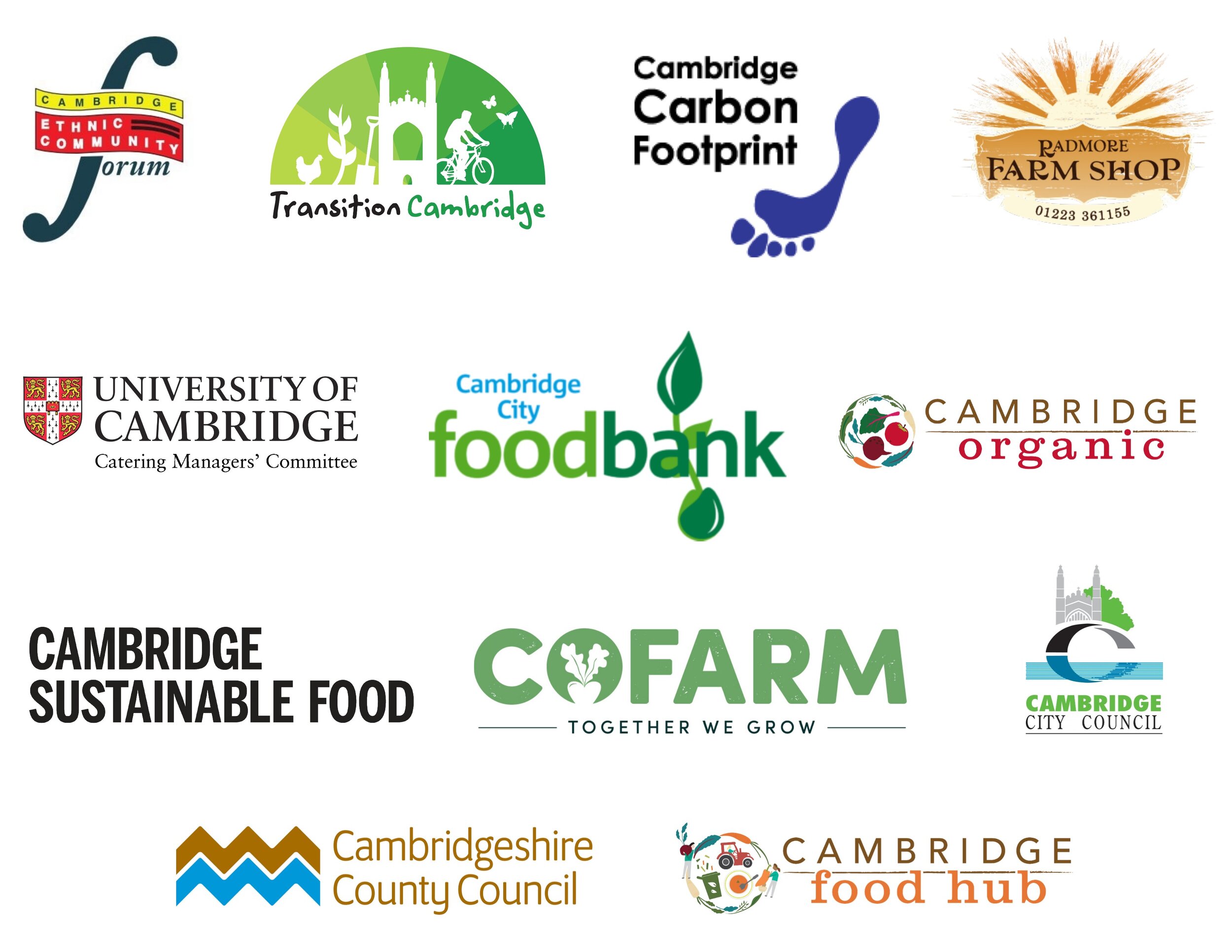Key Issue 1
Taking a Strategic and Collaborative Approach to Good Food Governance and Action
1A: ESTABLISH A BROAD, REPRESENTATIVE AND DYNAMIC LOCAL FOOD PARTNERSHIP
Cambridge Sustainable Food Partnership Board
The current Partnership Board, which meets 6 - 8 times annually, is composed of 16 members and represents a cross sector of food organisations: food poverty, community knowledge and skills, strategy and governance, planning, community farming, public health, university catering, local supply chains and retail. Terms of reference can be found here. The Food Partnership Board is made up of nominated key stakeholders as well as open to interested individuals and organisations.
Alliance, networks and groups
Food Poverty Alliance: Work is reported to the Partnership Board and the views of those with lived experience of food poverty are reflected in the Food Poverty Action Plan. The Cambridge Food Poverty Alliance is composed of 11 steering group members and 14 associate members. See terms of reference.
Sustainable Procurement Group: A Sustainable Food Procurement Group was established in 2019, with representation from the City Council, local business and the Soil Association. Terms of reference here. This follows the successful introduction of Sustainable Food Policies by Cambridge University and many of the Cambridge Colleges.
Growing Network: Cambridge Community Growing Group, run by the Cambridge University Botanic Garden, has 12 community garden members.
Community Food Hubs Network: Representing 9 Food Hubs e.g. Abbey People. These were set up in response to Covid-19 but are now considering how to continue whilst embedding sustainable food practices.
Support, policy, strategy
The City Council adopted a Sustainable Food Policy in 2018, which formally recognises CSF as lead partner in the city. Sustainable food is one of six key objectives in the new 2021- 2026 Climate Change Strategy; it is included in the Anti-Poverty Strategy and in the recent Sustainable Design and Construction Supplementary Planning Document. Full Council has also endorsed the Food Poverty Action Plan and created the post of Lead Councillor for Sustainable Food, who sits on the Cambridge Sustainable Food Partnership board. The council has supported Cambridge Sustainable Food with funding for food poverty, community outreach and business work, as well as allocating funding for a surplus food redistribution hub and community kitchen. Cambridge University and Colleges Catering Managers' Committee Sustainable Food Policies here and here support Cambridge becoming a Sustainable Food City. South Cambridgeshire District Council is funding Cambridge Sustainable Food to deliver Food for Our Future, a climate change campaign.
The wider context
Natural Cambridgeshire is establishing a sub-group on sustainable food. Cambridge Sustainable Food was a founding member of a campaign group, Cambridge 2030, formed in 2020 to address inequality and improve progress towards the UN Sustainable Development Goals – a member of Cambridge Sustainable Food Partnership Board is on their advisory board. Cambridge Sustainable Food’s CEO is part of the City Reference Group for the Covid-19 response, as well as the Climate Leaders group hosted by the City Council, and on the Cambridge Doughnut Economics Group which is being promoted by Cambridge City Council.
1B: DEVELOP, DELIVER AND MONITOR A FOOD STRATEGY/ACTION PLAN
Action Plan social media campaign
Action Plan
The Cambridge Sustainable Food Partnership produced a Sustainable Food Action Plan for 2017-2020 and consultation on the new Sustainable Food Action Plan began towards the end of 2019 through a public launch event, press and online consultation. However, further face-to-face consultation was put on hold due to Covid-19. We continued to collect feedback and suggestions during this time through our website and we restarted consultation at the beginning of 2021 with a social media campaign and series of workshops with the Partnership Board. The Cambridge Food Poverty Action Plan 2019 - 2023 developed through workshops, interviews with those with lived experience and questionnaires. It is contained in the new Sustainable Food Action Plan as well as being a standalone plan.
Our Annual Report summarises progress and measures success on activities and campaigns in the action plan and we will undertake a final review as we did for our previous action plan 2017-21.
Manifesto
Our Manifesto supports the Action Plan and asks people, businesses and organisations to join the Food for Change movement and contribute ideas to the new Action Plan, as well as pledging to take personal action. There is a pledge-award scheme for food businesses, backed up by detailed business support pages. Cambridge Carbon Footprint (represented on the CSF Partnership Board) has recently developed a Carbon Footprint calculator (for individuals) and a Climate Change Charter (commissioned by Cambridge City Council). Cambridge Sustainable Food CIC developed the information for the food section of the charter, which links to Cambridge Sustainable Food’s website. The Charter has one pathway for “individuals and households” and another for “businesses and organisations” and is being widely promoted by the City Council.
Partnership Board members are involved in delivery of partnership projects and campaigns as well as giving strategic direction and oversight. They are also at the forefront of developing new and innovative food initiatives, such as Cambridge Food Hub and CoFarm Cambridge, projects, such as Healthy Start Veg Box scheme involving Cambridge Organic, Veg Cities (with 46 partner organisations) and Sugar Smart (which had a multi-agency steering group, including public health representatives).
Branding from 2014 to 2019, seen at stall at Eat Cambridge Festival
Identity and branding
From the beginning (2014), Cambridge Sustainable Food worked with a designer to develop a strong brand and identity, with posters, leaflets, logos, T-shirts, banners and our website having a recognisable image. In 2014 CSF chose to sponsor the Eat Cambridge Festival and was allocated an extra-large stall in the foyer of the Food Fair, which established our presence in Cambridge. In early 2019, the Partnership Board worked with a marketing expert (pro bono) to refresh our image, delivering a more coherent message (Food for Change) with a more up-to-date and consistent logo, colour-schemes and imagery for our website, social media (Twitter, Facebook and Instagram), as well as all public-facing posters and other documents.






